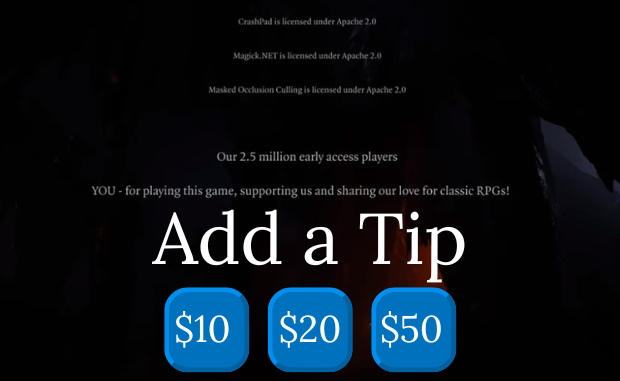
When it comes to the tipping culture in America, the majority of consumers can agree that it has gotten out of hand. But the idea that gamers should tip developers is a rather braindead take for a number of reasons. In a post on X/Twitter, Ex-Activision Blizzard president Mike Ybarra has offered a new solution for developers to make more money: that gamers should have the option to leave a tip for them after completing a video game they really liked.
“I’ve thought about this idea for a while, as a player, since I’ve been diving into single player games lately.
When I beat a game, there are some that just leave me in awe of how amazing the experience was. At the end of the game, I’ve often thought ‘I wish I could give these folks another $10 or $20 because it was worth more than my initial $70 and they didn’t try to nickel and dime me every second’”.
Ybarra, who was promoted to a co-leader position back in August 2021 amidst the company’s scandals, immediately makes a distinction in specifying that he is talking about single player games and not just games in general. After all, when it comes to games with a multiplayer component, there are a ton of ways that developers have come up with to entice gamers to part ways with their money. Whether through DLC, in-game currency, loot boxes, XP boosts, cosmetic items, or even pay-to-win items, it is all designed with the purpose of making the company more money.
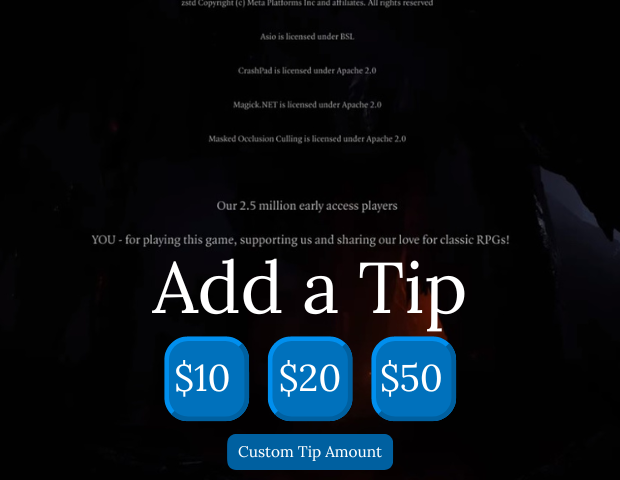
Expanding upon this idea, Ybarra provided some examples of single player games he wishes he could tip,
“Games like HZD, GoW, RDR2, BG3, Elden Ring, etc. I know $70 is already a lot, but it’s an option at the end of the game I wish I had at times. Some games are that special.”
For those unfamiliar with the acronyms, he is citing Horizon: Zero Dawn (Aloy is single btw), God of War, Red Dead Redemption 2, and Baldur’s Gate 3, in addition to Elden Ring, as examples of single player games he wished had included a tipping option at the end of the game. The problem with the idea of tipping the devs of these games is that this isn’t the 1980s or 1990s where a single player game was, usually, sold as a polished and finished product.
Even then, there were original soundtracks(OST) sold on CDs, posters, shirts, figurines, mugs, guides, pins, buttons, and other kinds of merchandise to generate more money for the company. This is how fans showed their support and appreciation for great video games. Buying the merchandise was their way of “tipping” and appreciating the fruits of the developer’s labor.
In fact, Ybarra’s examples all have merchandising to boost the profit of these single player titles. All AAA titles I must add. Which means that these specific games had significant budgets. They also have various means for making additional revenue. Horizon: Zero Dawn offers DLC, a LEGO set, and a statue among other things, Read Dead Redemption 2 offers in-game currency that can be purchased along with apparel and keychains, then there is Baldur’s Gate 3 which offers a limited edition soundtrack on vinyl (€99), and Elden Ring offers an assortment of statues, vinyl records, apparel, and even an Elden Ring Message LED Lamp ($119).
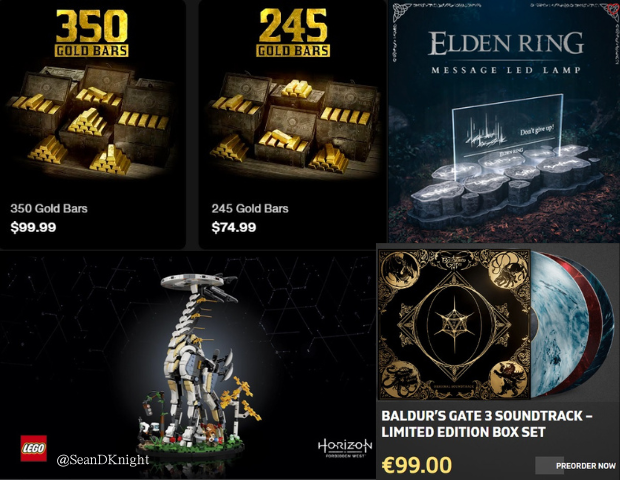
Of course, Ybarra is aware that this opinion will not be a popular one as he concludes,
“I know most will dislike this idea. 🙂 BTW, I realize we are tired of “tipping” in everything else – but I view this different from a pressure to tip type scenario many face and give feedback on.””
So what makes Ybarra’s opinion about dev tipping a braindead one isn’t just that he is ignoring the plethora of ways that developers have monetized even single player games, but that he is suggesting this during a time of economic upheaval. A time where the majority of gamers are dealing with economic hardships and in an industry that keeps unjustifiably inflating the prices of video games which are now around $60-$70 per title. Or has resorted to insane heights of gouging with recent examples such as Ubisoft’s Star Wars Outlaws, Dragon’s Dogma 2 from Capcom, or even Diablo 3.
If Ybarra’s opinion about tipping comes out of the idea that developers aren’t making enough, which he doesn’t bring up, then that is not the gamer’s problem or concern. After all, while tipping is usually reserved for exceptional service, it doesn’t apply to many jobs because those jobs pay a sufficient wage or are supposed to. People don’t deserve a tip for doing their job which is a fact that we here in America have forgotten as there are tips for everything and everyone.
Having worked in retail for 15 years (Toys R Us/Babies R Us), there wasn’t an expectation of getting a tip for doing our job. In fact, the company policy was that we didn’t accept any tips for any reason. However, when you are going out of your way by carrying furniture, swings sets, power wheels, and other large and heavy products to a customer’s vehicle and loading it in or even tying it down to the roof, a tip was appreciated because we were going above and beyond (another interesting thing was that employees were not supposed to help tying down the product to the roof of a vehicle).
Of course, that was in retail.
The food industry service is a different beast as serving staff are usually paid below the minimum wage in America. For myself in retail, a tip was a nice bonus and reward which was appreciated but not necessary, for waiters it is a forced necessity in order to make a living wage (which is sometimes shared amongst the rest of the staff or even the employer takes a cut). So when it comes to developers, they don’t deserve a tip. They are paid hourly or have a salary and they are supposed to get bonuses if the product they produce is a success.
Gamers do not have to even think about tipping them because the developers were already paid for their work. And, if the product is great or exceptional, the gamers reward the developers by buying the merchandise (like I did by purchasing the digital soundtrack for Dear Esther), giving their product free publicity by talking to their friends about the game, recommending the game to their friends, talking about it on social media, streaming it, or creating content about it.
So if the company isn’t sharing the residual sales from merchandise with the developers, then that is the developer’s problem and not the gamers. In fact, why would gamers trust the company to give the tips to the developers in the first place? Or simply take a chunk for itself before passing on the leftovers to the workers?
Suffice to say, the more a company makes, the better they should be able to pay their employees. However, a game’s monetary success also means job security for developers which is far more important than a tipping system for them. It is not only a braindead opinion but a ludicrous one considering how the industry works and how developers are paid.
Finally, you can’t expect a consumer base that is being gouged by the industry to further empty their pockets through an asinine idea that developers should be tipped. The best solution would be to share the merchandising revenue with developers since, most likely, the company doesn’t do that in the first place. The selling of merchandise is the tip. Whether or not the developers get a piece of that is another matter.
So say no to dev tipping.
Author’s Note: Support this site by donating via Paypal or even checking out our merchandise on RedBubble where you can find designs that cater to writers and readers. Money donated and raised goes into paying for this website and equipment.
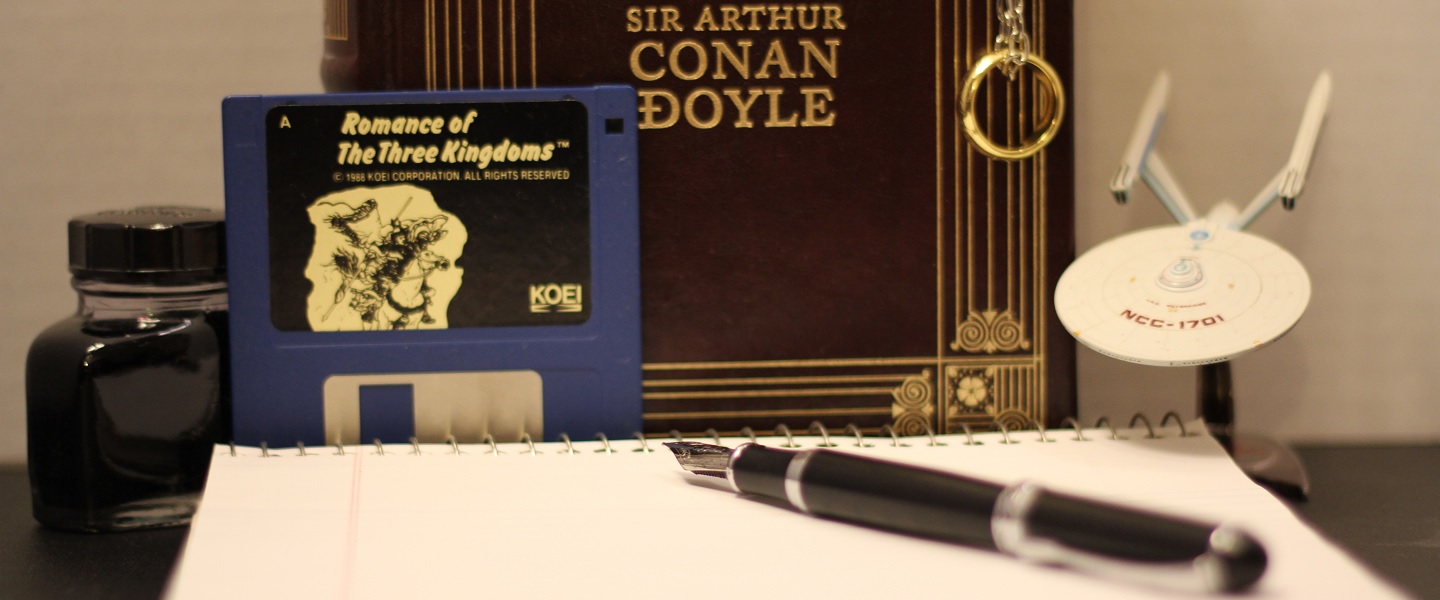


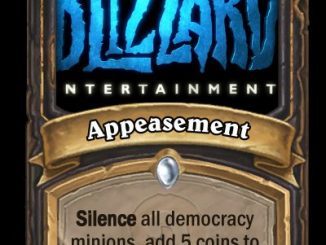
1 Trackback / Pingback